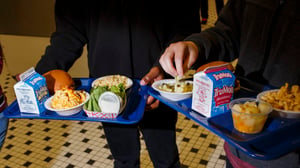Foster Care to Adoption
Of the 428,000 children in foster care in the U.S., over 30% cannot be returned to their families and are waiting to be adopted. 135,000 children are adopted each year and there are currently 1.5 million adopted children in the United States. 59% are from the child welfare (or foster) system. Children enter foster care through no fault of their own because they have been abused, neglected or abandoned. These children are in the temporary custody of the state while their birth parents are given the opportunity to complete services that will allow the children to be returned to them if it is in the children’s best interest. Unfortunately, 30% of them never make it.
Read More
Topics:
Foster Care,
Adoption,
social workers,
what social workers do,
Family and Child Welfare
Social workers Dre’ Johnson and Renee Brean are part of a pioneering new approach to policing in Rochester, New York. They belong to the city's “person in crisis” team – a unit of mental health and behavioral professionals who attend police calls where a person may be suffering a mental health episode.
The premise behind the "person in crisis" team is simple: it contends that for all their training and skills, police are not equipped to deal with the complexities that a mental health crisis requires. By sending mental health professionals along to 911 calls that may involve potential psychological breakdowns, officials hope that these situations can be dealt with more sensitively, and more safely.
Read More
Topics:
Homeless & Food Pantry,
mental health,
social workers,
what social workers do
The COVID-19 pandemic swept the nation, killing more than 184,000 residents and staff of nursing homes and other long-term care facilities. The post pandemic response to this massacre has been confusion, doubt, and indecision on the part of the elderly and their caregivers about the use of long-term care facilities.
Read More
Topics:
Elderly/Aging Long Term Care,
what social workers do,
Covid-19/Pandemic
Your response to last week's blog on the social worker's role in juvenile justice was overwhelmingly positive but many of you thought that the issues might be better clarified in context. So, let's try to put juvenile justice in some historical perspective.
Read More
Topics:
Child Welfare,
Juvenile Justice,
social workers,
what social workers do
- During a single year, an estimated 2.1 million youth under the age of 18 are arrested in the United States.
- Though overall rates have been declining over the past years, approximately 1.7 million delinquency cases are disposed in juvenile courts annually.
- Youth are referred to the juvenile justice system for different types of offenses.
- The majority of youth processed through the juvenile court are adjudicated (i.e., declared by a judge to be) delinquent, for most offenses.
Read More
Topics:
Child Welfare,
Juvenile Justice,
social workers,
what social workers do
The COVID-19 doomsday pandemic introduced an entirely new class of celebrity to the American zeitgeist, the public health official. From Anthony Fauci, the wise old sage of caution and mutual concern, to Robert Redfield, the reluctant dour villain caught between the evil genie and an army of helpless victims, to Rochelle Walensky, the newcomer fairy godmother who wished us well and told us it would all end happily, to Vivek Murthy, the good scout who counseled us not to fear the final dangerous crossing. All public health officials - all newly minted celebrities.
Read More
Topics:
social workers,
what social workers do,
Covid-19/Pandemic
With the popularity of CSI shows, the word "forensic" has wormed its way into our everyday conversations. No one, however, seems to know what it means. "Forensic social work", therefore, is an even deeper mystery. We decided to ask a real "forensic social worker" exactly what forensic social workers do. Here's what she told us.
Read More
Topics:
Social Services Industry News,
mental health,
social workers,
what social workers do
"Social workers are my collective heroes. They sit at the juncture between those with too much power and those with not enough. "
- Gloria Steinem -
Read More
Topics:
social workers,
what social workers do
Paperwork is a dirty word in social services. Social work is not about keeping records, it’s about “hands-on” interpersonal contact with abused children, single parents, the neglected elderly, the abandoned homeless, and other vulnerable populations. As you might suspect, as social work became a more integral part of our society’s fabric, our social workers have been swamped by a virtual paperwork tsunami.
We recently talked to a child and family services case worker in Phoenix, Arizona who, contrary to popular opinion, shed a positive light on all this confounded paperwork.
Read More
Topics:
Social Services Industry News,
caseworkers,
social workers,
what social workers do
Only social workers who deal with childhood hunger every day realize how devastating the COVID-19 pandemic has been for millions of everyday school children who attend school with your children and mine. For many of your children’s classmates, not attending in-person school has meant missing 5 essential meals a week and, in many cases, the bulk of their nutrition.
Read More
Topics:
Homeless & Food Pantry,
education,
what social workers do,
Covid-19/Pandemic











